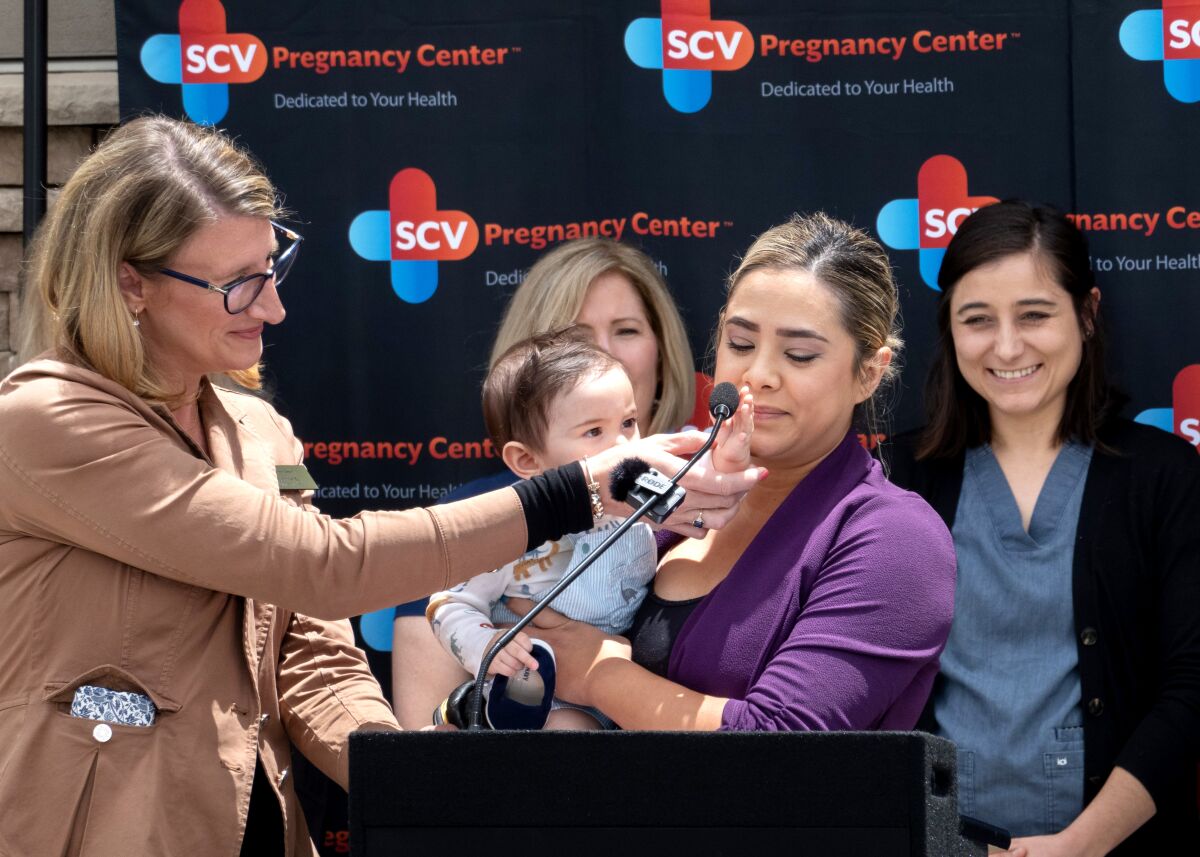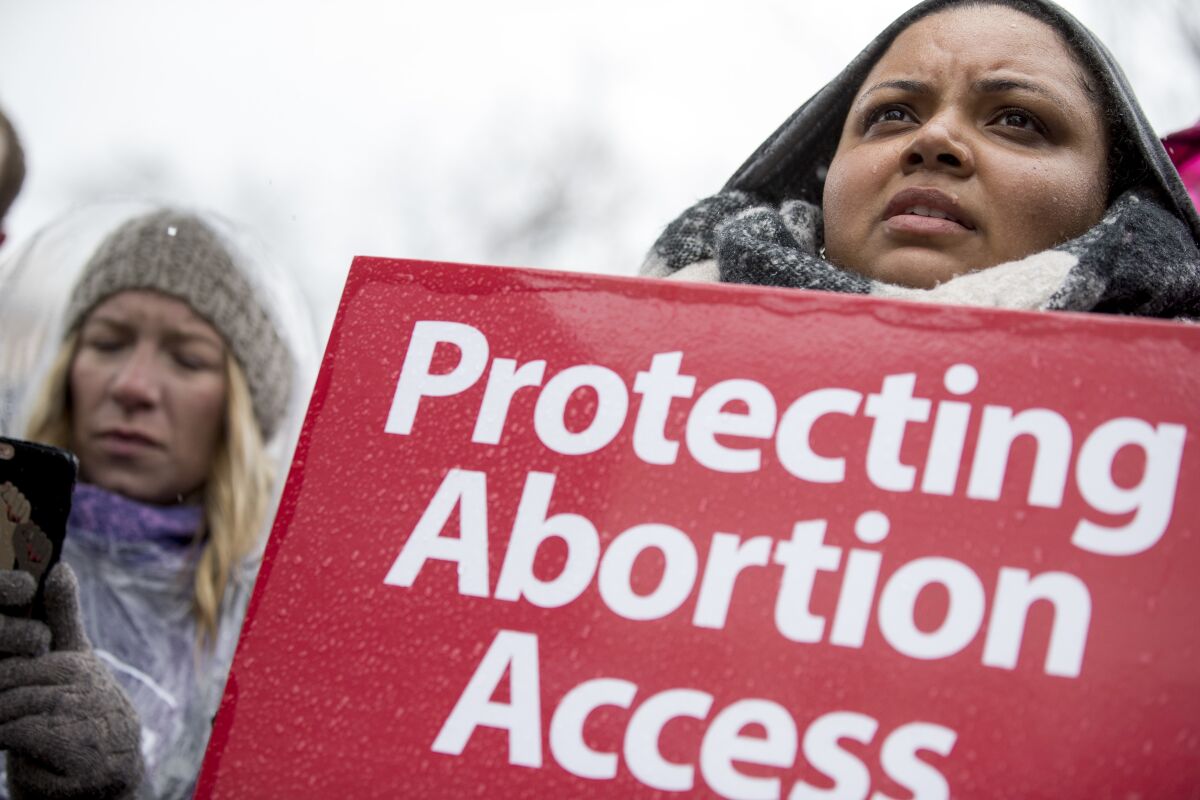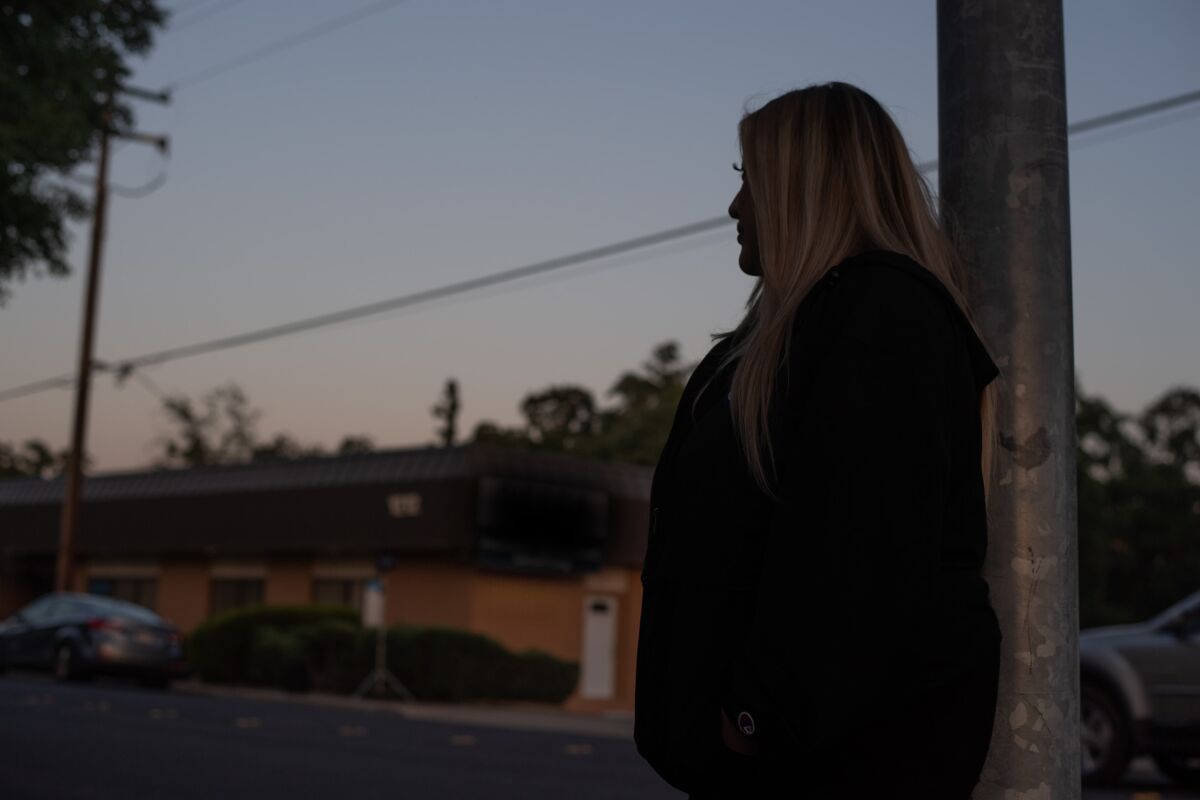At Sierra Pregnancy and Health, Executive Director Cary Wilcox beams with pride holding a plastic model of what will soon be a new mobile clinic thanks to a flood of donations after its “biggest year ever.”
Outside the nondescript nonprofit just 20 miles from the California capital, a sign advertises “abortion pill reversal” — a practice involving the hormone progesterone that the American College of Obstetricians and Gynecologists deems “unethical” and “not supported by science.”
The facility is licensed by the California Department of Public Health as a community clinic but has been flagged as a “crisis pregnancy center” — an industry long accused of misleading women about their services in order to steer them away from abortion.
The Roseville-based center provides free pregnancy tests and first-trimester ultrasounds advertised as part of “pre-abortion screenings” but does not offer abortions or help women get them. Its medical staff includes unpaid retired doctors and nurses who volunteer their time, Wilcox said.
A watercolor painting of a wave hangs above a couch in the consultation room, where clients are warned of abortion-related grief and given pamphlets that ask “is God listening?” A magazine the clinic hands out cites research linking abortion to breast cancer that has been refuted by the American Cancer Society.
Wilcox said part of the clinic’s mission is to “share the love of Jesus,” but she rejects the idea that her industry exists to coerce women out of abortion.
Her clinic is a community resource, she said, pointing to 10,000 diapers and wipes given away in the last year alone and to items such as car seats and baby monitors that parents can “earn” through taking approved parenting classes.
“We don’t force births. Someone can still walk out of here and get an abortion,” she said. “We don’t judge. Our job is to help her make an informed choice.”
Sierra Pregnancy and Health in Roseville, Calif., offers “abortion pill reversal,” which is not authorized by the FDA.
(José Luis Villegas / For The Times)
Across California, where Democratic lawmakers have crafted some of the nation’s strongest abortion rights laws, antiabortion pregnancy centers appear to be untouchable despite repeated attempts to rein them in.
And some are even expanding, boosted by an influx of donations from abortion opponents who object to the enhanced protections enacted in California in the wake of the U.S. Supreme Court’s decision to overturn Roe vs. Wade.
The centers, primarily faith-based nonprofits, have managed to evade legislative attempts at stricter regulation, which the Supreme Court ruled violated the 1st Amendment.
Two state bills to limit them quietly stalled this month, even as the latest package of abortion access laws is otherwise expected to succeed.
Though the issue has become a legal minefield, California Democrats who have vowed to make the state a reproductive rights haven aren’t giving up.
Atty. Gen. Rob Bonta issued a consumer alert last year, warning of potentially misleading practices by crisis pregnancy centers, and created a new process for Californians to file complaints.
Bonta declined to comment on whether there are any ongoing investigations but said the new complaint portal has been “very helpful” and that his office is “prepared to act” on any violation of the law. That could include prohibitions against companies committing fraudulent business acts.
“We’re not just intent on protecting the reproductive freedom that we have but also expanding it, and part of that is Californians getting and having access to truthful and timely and accurate information about abortion services,” he said.
The industry has gotten harder to regulate as it has moved away from the “egregious” misrepresentations that it was built on, Bonta said.
“They’re moving into more of a gray and ambiguous space, where they’re saying things like, ‘Come in and talk to us about abortion options,’ ” Bonta said. “It’s not necessarily false, it might be misleading, but it’s not a black or white violation.”
In 2018, the Supreme Court blocked enforcement of a California law that would have required all clinics to notify patients that the state offers subsidized abortions, birth control and prenatal care. Known as the Reproductive Freedom, Accountability, Comprehensive Care and Transparency Act, the bill was sponsored by Vice President Kamala Harris, then state attorney general.
The court’s opinion was led by conservative Justice Clarence Thomas, who said that the law unfairly targeted faith-based centers by forcing them to provide a “government drafted script” about services they oppose.

Former client Patti speaks about her experience with the SCV Pregnancy Center in Santa Clarita while she was pregnant with her 9-month-old son Liam at a news conference on Wednesday. The event was to voice opposition to legislative attempts to regulate the controversial centers.
(Myung J. Chun/Los Angeles Times)
Crisis pregnancy centers are central to antiabortion activists’ agenda, said Meghan McGuirk, associate director of state legislative affairs and counsel for the abortion rights organization NARAL. “The anti-choice movement is organized and they know what they’re doing. They are going to use every tool they have to try and undermine access to reproductive healthcare,” she said.
Some centers such as the Mendo Lake Women’s Clinic in Ukiah are expanding their services. The center pledges to work to “erase the need for abortion.”
The facility, licensed by the state as a free clinic, claims on its website that adoption can prevent depression “caused by abortion.” (According to the Journal of the American Medical Assn., research has failed to show abortion has a causal effect on mental health.)
There are at least 165 crisis pregnancy centers in California, and they outnumber abortion clinics, according to a report issued last year by the Alliance, a women’s advocacy collaborative.
The report found that many of those centers make “deceptive and misleading” claims, do not have a physician on staff and offer nondiagnostic ultrasounds that are not recognized as a medical service but as a “keepsake” or souvenir.
Abortion opponents have “expanded and elevated” the role of crisis pregnancy centers in recent years, according to a brief issued by the Alliance in 2022.
While abortion access is protected in California, that also makes the state a target for donors looking for crisis pregnancy centers to support, said Assemblymember Rebecca Bauer-Kahan (D-Orinda.) She worries that more pregnancy centers will pop up in rural and low-income neighborhoods, where women may struggle to access care.

An abortion rights supporter holds a sign during a rally outside the Supreme Court in Washington in 2018, as the Supreme Court heard arguments in a free speech fight over California’s attempt to regulate anti-abortion crisis pregnancy centers.
(Andrew Harnik / Associated Press)
A bill she proposed this year would have potentially opened crisis pregnancy centers up to lawsuits if they advertise using “false or misleading” statements. But the legislation failed.
“There’s no question that this should be stopped,” said Bauer-Kahan, chair of the Select Committee on Reproductive Health. “It is not just conjecture: They are focusing their energy on states like California.”
California law specifically names “alternative birth centers” as a type of specialty clinic eligible to operate in the state. That means a clinic not part of a hospital that provides “comprehensive” services for pregnant women who spend less than 24 hours at the facility, according to state safety code.
Bonta said although some centers are licensed, it doesn’t mean they are without limits. “Just because you’re licensed to do something doesn’t mean you’re licensed to do everything,” he said.
Pregnancy center leaders maintain that they are upfront about the services they do and don’t provide, but women seeking an abortion still get confused — even by clinics licensed by the state.
A young woman in the Sacramento area confirmed her pregnancy at a Planned Parenthood clinic but could not afford the $450 an abortion would cost there without insurance.
Already a mother of a 1-year-old, she found a pregnancy center online, drawn in by its promise of free medical services for women dealing with unplanned pregnancies. The website advertised a consultation that mentioned parenting, adoption and abortion as options.

A Sacramento woman felt duped and shamed by a local crisis pregnancy center when she sought an abortion.
(Jose Luis Villegas/For The Times)
But the center does not actually provide abortions or make referrals for them — which it also states on its website. The woman didn’t realize that until she was already there.
Inside, she was questioned for over an hour about her “lifestyle,” she said. With her boyfriend by her side, a staffer told them that the odds of a couple breaking up because of an abortion are 80%, and that most people regret it.
Ultimately, she miscarried and did not need any services but left feeling “embarrassed and hurt.”
“They shamed me so much in that room,” said the now 29-year-old woman, who asked not to be named for privacy reasons. “Honestly, I had no idea what I was in for. I didn’t know places like this existed. I thought it was just in movies.”
A bill introduced by Assemblymember Pilar Schiavo (D-Chatsworth) would have launched a statewide awareness campaign about any services related to pregnancy care and abortion.
AB 710, which was projected to cost the state up to $8 million, failed this month as part of a mass culling of bills with price tags as California faces a budget deficit.
Schiavo said she viewed the bill as noncontroversial and simply informational as it pertained to any relevant facility, not just crisis pregnancy centers. But she made it clear in legislative hearings that they were her top concern, calling them “extremely dangerous.”
The bill drew fierce opposition from conservative groups, including the California Family Council, which held a news conference on Wednesday outside a pregnancy center in Schiavo’s district, accusing her of defamation and of judging an entire industry based on a few bad actors.
Abortion critics, including the California Catholic Conference, said the bill was prejudiced and that the state should instead be thanking the centers for helping vulnerable women.
Schiavo called the outrage “really telling.”
“In California, this is really the only way that anti-choice extremists can promote their agenda. [Centers] can just proliferate and thrive and grow exponentially with no restrictions,” Schiavo said. “Women simply having the facts … it completely undermines their whole business model.”
The Los Angeles City Council put crisis pregnancy centers on alert last year, passing an ordinance that fines them up to $10,000 for false advertisement and allows people to sue if they have been misled.
Kelly Pfeifer, a doctor who has performed abortions for 25 years, is among those urging the state to do the same. She testified to lawmakers earlier this month that some of her patients have been given false ultrasound images by the centers to convince them they are further along in pregnancy than they actually are.
She has had patients cry, worried that they would be infertile because of false information told to them about abortion by people they believed were trustworthy health professionals, she said.
“Every day, I see people who have been harmed by these fake clinics,” Pfeifer said. “In any other part of the healthcare system, this would be inconceivable.”
Heidi Matzke has positioned herself as the face of California’s modern pregnancy center movement. She traveled to Washington, D.C., last year to testify against a federal bill aiming to crack down on the centers, and has railed against Planned Parenthood on Fox News.
Her newest pregnancy center will open soon in Sacramento and looks more like a high-end salon than a medical clinic. The 7,000-square-foot facility is stark white and filled with hot-pink furniture and gold-trimmed mirrors. Thousands of dollars have been spent on security cameras, bulletproof glass and graffiti-resistant paint.
The building alone cost $1.5 million — all from donors.
The official motto of Alternatives Pregnancy Center, which opened in 1983, is to provide women with medical care “and alternatives to abortion as we proclaim the hope of the Gospel.”
It provides gynecological care such as Pap smears and breast exams at no cost — rare for crisis pregnancy centers. But like most centers, it also offers the controversial “abortion pill reversal” and something called “abortion recovery classes.”
“If they choose life, they go through this door,” Matzke says of her clients, pointing to a room full of pristine baby clothes given away free. If they choose abortion, they’ll still be “loved on” and supported, she said.
“A woman is more than just a choice that she makes,” she said.
Matzke is a tireless debater; for every scientific study that casts doubt on her services, she holds up another more obscure study that supports them. It’s Planned Parenthood, not pregnancy centers, that are judging their patients, she insists.
“They want to choose life but they need help and they need support,” Matzke said of her clients. “And so when they find a clinic like ours to support them … then a lot of them will step up and choose life.”
California’s leading Democratic lawmakers have ignored Matzke’s invitations to visit her clinics, leery of giving a microphone to her cause. But the license granted to her from the state they represent hangs clearly in her lobby, framed with gold prongs to match her new decor.
“We have nothing to hide,” she said.
This story originally appeared on LA Times

